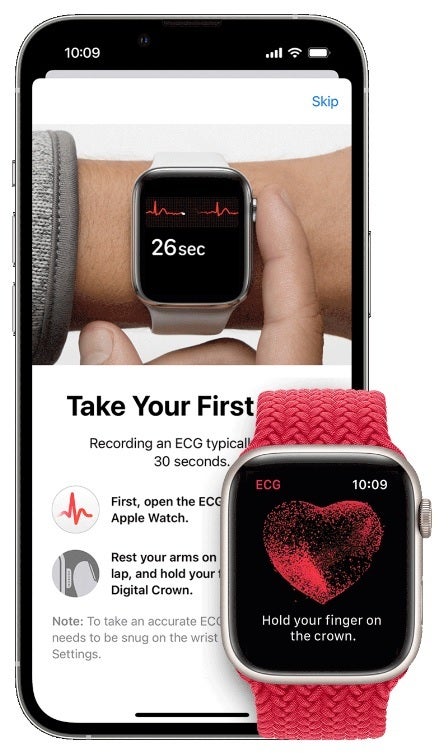Study shows that the ECG sensor on the Apple Watch could notify users of rising stress levels

According to a study conducted by researchers at the University of Waterloo, Canada (via MyHealthyApple, MacRumors) the electrocardiogram (ECG) on the Apple Watch can help predict the stress level of the user. Other wearables, such as Fitbit smartwatches, use Heart Rate Variability (HRV) to come up with a stress score. HRV measures the time between heartbeats and can range between below 20 to over 200 milliseconds.
Fitbit timepieces also measure the electrical properties of the user's skin and skin temperature to predict future stress levels. Garmin smartwatches predict stress by using a rather simple method; if the variability between heartbeats is declining, stress is rising. If variability between heartbeats is increasing, stress is declining. Some of these devices will not only alert the user that he is on the way to getting stressed out but will also suggest some breathing exercises designed to immediately help him chill.
The Apple Watch ECG sensor can be used to predict stress
Amazingly, the single lead ECG on the Apple Watch compares favorably to the 12 lead ECG used by hospitals. Apple says, "The ability of the ECG app to accurately classify an ECG recording into AFib and sinus rhythm was tested in a clinical trial of approximately 600 subjects, and demonstrated 99.6% specificity with respect to sinus rhythm classification and 98.3% sensitivity for AFib classification for the classifiable results."

Survey shows that the ECG on the Apple Watch could be used to predict stress
A recent study was conducted-the first of its kind-to see how well the ECG sensor on the Apple Watch can measure stress. Those taking part in the study were each given an iPhone 7 with iOS 15 installed and an Apple Watch Series 6 (which has the ECG sensor and watchOS 8.3 installed). The participants were given the devices for two weeks and were told to collect data six times a day, every three hours.
Prior to starting the testing, the participants had to fill out a stress questionnaire on the iPhone that was found on an iOS app developed by the researchers. Machine learning algorithms and other factors like the subject's age, gender, and job were used for the study.
The researchers wrote, "In general, the 'stress' models had a high level of precision but lower recall. The 'no stress' models performed generally well with a recall typically above 60%. Considering the ultra-short duration of the ECG measurements performed here compared to the standard, as well as the nature of real-life measurements, the results presented were quite promising."
Many wearables offer stress monitoring, even the low-priced Xiaomi Smart Band 7
The researchers also believe that the ECG sensor on the Apple Watch, combined with the sleep monitoring feature on the timepiece, and its ability to track physical activity, could be developed into an accurate tool to predict higher stress levels. And Apple Watch users could take a notification of an impending rise in their stress levels to get help early enough before their mental health deteriorates further.
As we pointed out, many smartwatches offer some type of stress monitoring, even the Xiaomi Smart Band 7 will give you a reading (this writer is showing moderate stress as he works to complete the article). Perhaps Apple is working on a stress monitoring system of its own that might combine the ECG with some existing or new sensors.
In case you were wondering, the ECG monitors your heartbeats for abnormal rhythms that could indicate that the user is suffering from Atrial fibrillation (AFib). This past September, we told you about a woman in the U.K. who was a passenger in a car when she started to feel dizzy and her heart was pounding. Her son put his Apple Watch Series 8 on her wrist and ran an ECG which detected atrial fibrillation. Just to be sure, he ran the ECG a few more times and each test came back the same.
The woman was taken to the closest emergency room where she underwent surgery. Her son said, "The NHS (National Health Service) specialists that looked after her said that if it wasn’t for the Apple Watch, there’s a high probability she wouldn’t have made it through the rest of the day."
Follow us on Google News













Things that are NOT allowed:
To help keep our community safe and free from spam, we apply temporary limits to newly created accounts: